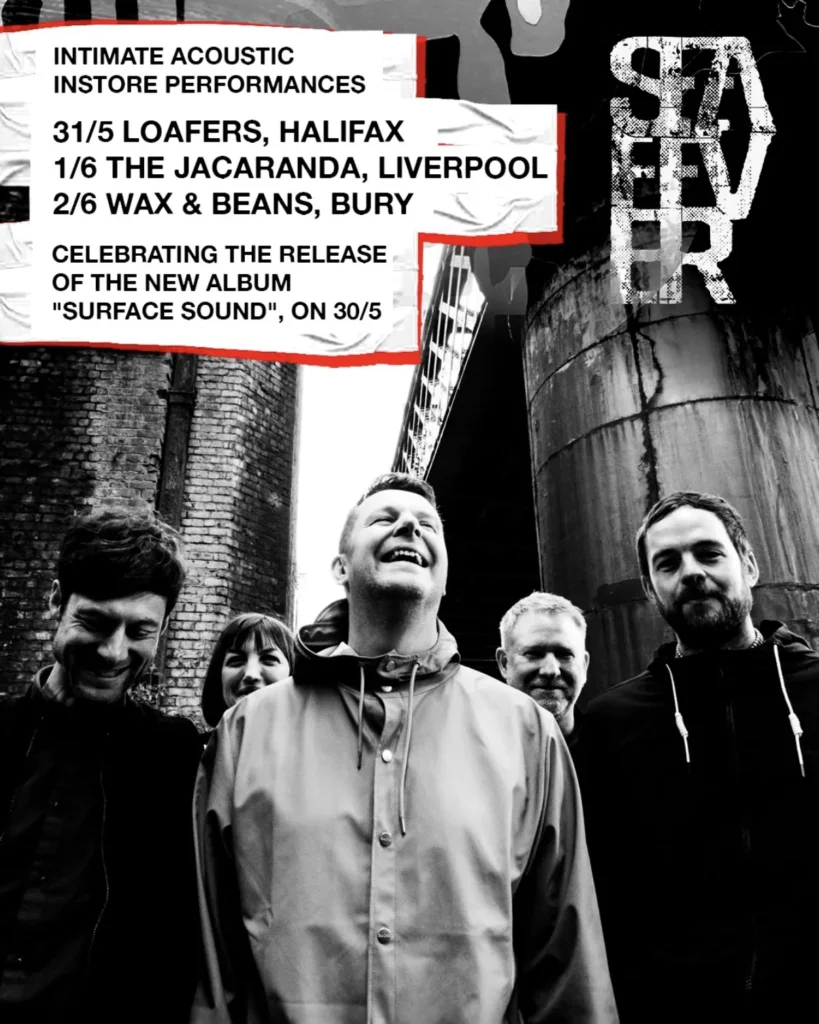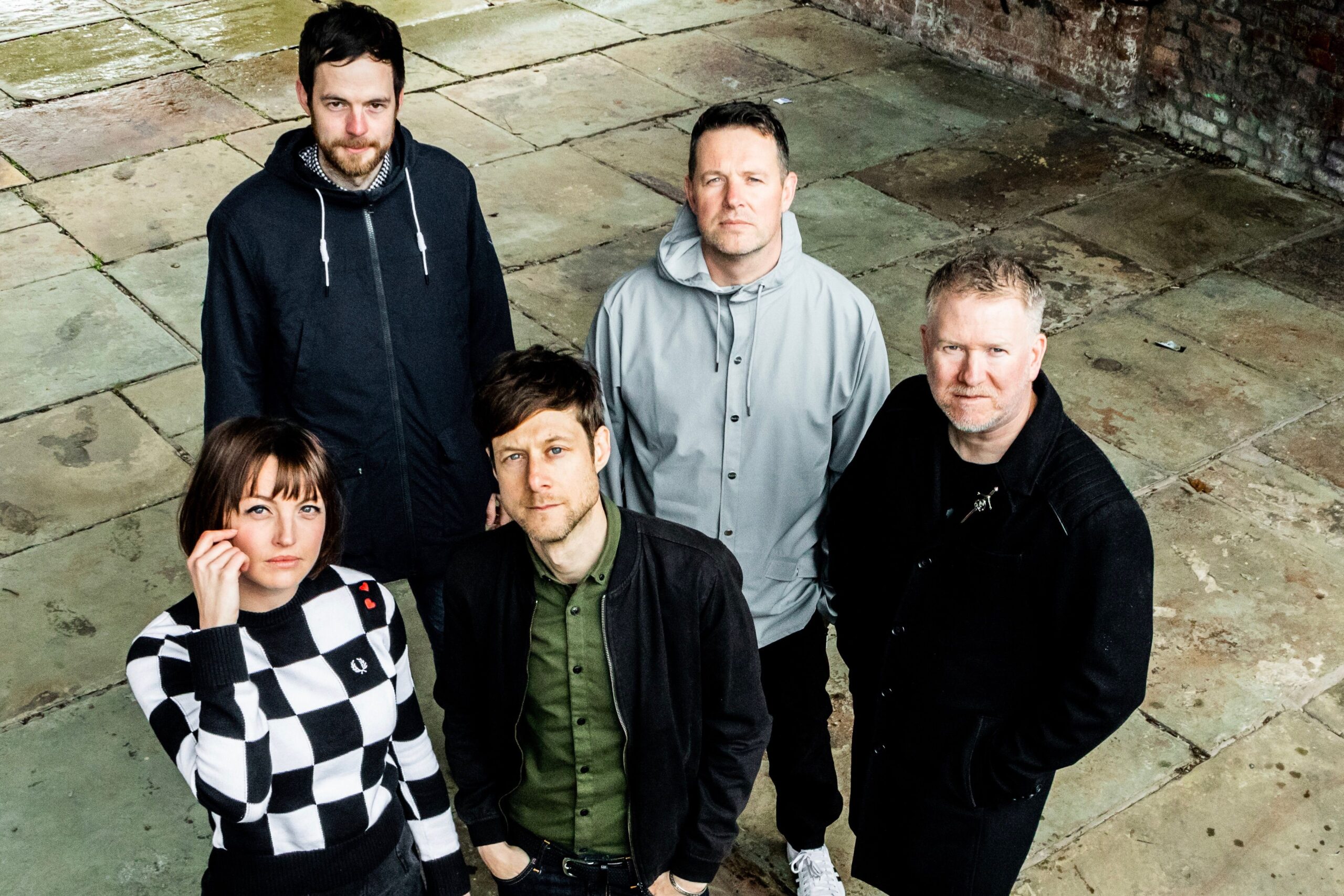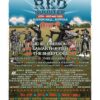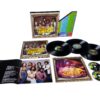Manchester-based five-piece Sea Fever have made quite the name for themselves on the live circuit since the release of their debut album Folding Lines, earning praise for their bold, genre-blurring sound and compelling performances. Featuring members from iconic acts like New Order, Section 25, and Johnny Marr’s band, Sea Fever bring a wealth of experience and a unique musical chemistry to everything they do.
To celebrate the release of their follow-up album Surface Sound, out on 30th May, we caught up with frontman and guitarist Iwan Gronow and bassist/synth player Tom Chapman to talk about how the record came together, the creative journey behind it, and the special dynamic that drives the band forward.
Surface Sound has been a long time in the making. Are you looking forward to the album launch?
Tom: Yeah, I think we are, because it’s finally coming to an end – all of the hard work is going to pay off and people are going to finally be able to hear the album, which is really important to us. It took ages to find a home for it, which delayed the whole process, so it felt like we we’d been on sitting on it for a while. But yes, it’s a good feeling!
Do you feel your approach to songwriting evolved between the two albums, especially with a few years separating their releases?
Tom: 100% yes. I mean, we’re we’re getting better and better, and, we’ve never stopped. That’s the thing – we never really stopped writing after Folding Lines, we just carried on. We didn’t take a break or anything. That’s partly my fault though I think – I’m always that guy who calls everybody up asking if they want to write some stuff.
Iwan: We had quite a few tracks leftover too. I suppose we wrote so much over the pandemic, because we couldn’t gig or anything. We had material left over from the first album, and carried on from there, and it’s the same with this one. We’ve got quite a few tracks for the next album.
Tom: I think we’re seven tracks into it already. We’re quite good like that. We’re fast and we like writing, which is good!
Iwan: The writing’s never really an issue. I think, like many bands and musicians, once the album’s finished, there’s this moment of, “Right… what next?” Unless you’re someone with a big deal and years left on a contract, it’s a bit different. A lot of musicians have been sitting on albums, trying to find a home for them. It’s a different time to write and release, I think. We’ve got a really good family now. Ben’s been brilliant, and Matt, and all the guys who worked on this album at Cosmic Glue. It feels like something that could really continue. Fingers crossed it does.
That’s great. There are so many labels around these days.
Tom: The role of a label has changed a lot now. You’ve really got to think about what you actually want from a label these days. It’s not like the good old days when you’d get a big advance and a lot was covered in the deal. These days, a label will ask you, “What are your expectations from us? What do you think we can bring to the table?” I think artists are generally much more involved in the release process now. I know we are – we’re very close to it. We monitor everything closely and want to stay on top of what’s happening. I think that’s a really good thing. It gives you a sense of control over what’s going on with the release.
Iwan: Sometimes when you’re younger, when you have that huge advance, some bands don’t really realise it’s just a massive loan, really. You don’t really think about it – you just see the money and go with it. But things sometimes slip. Labels do stuff while you’re off touring or just enjoying it all, and you don’t feel in control. Things fall through the cracks. Now you’re in control of everything. A lot of bands are just using distribution labels now. They’re not really full record labels anymore. You can do so much yourself now. On the flip side, labels are saying, “Well, we can’t make much from vinyl anymore”, so they want a cut of your merch, your live shows – things like those 360 deals. And you can kind of see their point – they’re making an investment. You can see both sides, really. It’s a difficult one. If they’re not making the money they used to from vinyl, they’re going to look for other sources to take a cut from.
Tom: Touching on the label thing, it’s really difficult for a band or artist these days to survive without a hitch. Labels often expect you to come up with a hit on your first record, and there’s little room for development. Crafting your sound takes time – playing live, evolving, and developing your identity as an artist. It’s not something that happens overnight, unless you’re really lucky. You know, especially for us – we’re a few years in, but I feel like we’ve only just started to really peak with our writing and how we play live. It’s only now that things are coming together, and it’s taken us a few years to get here. So, it’s difficult to be expected to have instant success as an artist or band. It takes time. Songwriting is a craft that you build over time, and the more you do it, the better you get. Certainly for us, it’s been that way.
The new album’s packed with strong songs – many of which fans will recognise from your gigs over the last eighteen months or so.
Tom: I think you’ve pointed it out in one of your reviews that we approach every song that we write like it’s a single. We’re always trying to make them as strong as possible, melodically, musically, and lyrically. I think it’s something we’re very conscious about when we write. Would you agree with that, Iwan?
Iwan: Yeah, I think they’re rhythmically very different from each other, and there will be differences in the guitar and keyboard parts as well. But the one thing that remains the same is that we always aim to write a good song. We’re doing some in-store performances soon, and for most of them, the songs sound just as good acoustically. That’s something Joe [Moss] used to say to us during the Haven days – if you can play a song on guitar and it still sounds strong and projects well, whether it’s with just a couple of people, the whole band acoustically, or even just one person, it really shows the strength of the song. Even if it’s something like ‘Breaking Out’, with a pretty keyboard and a symphonic, dancey, modern vibe, we could still sit and play it acoustically, and I think it would still sound solid. The rhythms may change, and there might be different vibes – one might be more indie, another might lean into electro – but at the core, they’ll all be good songs. That’s the consistent thing throughout, I think. That’s what we aim for, anyway.
That’ll be interesting at the end to see them with such a different vibe.
Iwan: Yeah, we were having a strum through the other day just before rehearsal, and I think it’s going to be really good. We’ve done a couple before. We did Loafers, didn’t we? And one in Wigan.
Tom: That was with Chris Hawkins.
Iwan: Yeah, he did like a Q&A at the old chapel. Then we did one at Loafers, and played about three or four songs. It was good fun, and it was great to work the songs out in that way.
Have any of the songs changed, like, drastically from the demo, Or are they all quite similar still?
Tom: Good question! I’m trying to think from the music point of view. Not really. I think I presented them pretty much as they sound now. There’s been the odd change lyrically. I think that you’ve changed a lot of things, haven’t you?
Iwan: I think there’s been the odd sort of double chorus put in there. I don’t think they’ve massively changed. ‘Loose Cut’ changed quite a bit vocally, because it turned into a bit of a dance romp. And Pete did a really great job with the vocals. But musically, not massive amounts – just bits here and there. Not like full reconstructions of songs, because that can turn into a headache.
You’re such a slick live band, when you’re writing the songs are you thinking about playing them live? Or is that something you adapt to later on?
Tom: No, because up to now – though this might change – it’s never been the five of us in the same room writing music. It’s always been me presenting an instrumental to either Iwan or Beth. I think we once went into a studio, in a cottage – that was an experiment to see if we could work with each other. That was for the first album, and it was positive. An idea never starts with the five of us in a room together though. Usually, I’ll send a piece of music, and I’ve got a pretty good idea of the songs structure. But it’s never a finished product until everybody is involved – then it’s a Sea Fever track. Up until then, it’s just a demo.
I guess it expands and evolves as each member brings their own talents and ideas into the mix?
Iwan: It does. ‘Breaking Out’ is the perfect example of that, because it was nearly going to be left for the third album.
Tom: What were we thinking, Iwan? What were we thinking?
Iwan: I suppose that one actually did change quite a bit, because we added stuff when we went into Hope Mill. I think we added a bit of the guitar. There’s a guitar break. I think me and Phil put some guitars down, and then we kind of left it for a while. Vocally, I think it just had the chorus and we weren’t sure about verses, then we found some bits that Beth and I had done. Later on, we took a look at it and it sounded so strong. Tom had mentioned adding a bass section, but once we started working on it more, we couldn’t really change it, because it sounded too good. It sounds more like a single now. Sometimes you think, ‘Do we hold it back for the first single of the next album?’ But nowadays, it’s different. It’s just good to get stuff out there. Back in the early 2000s, it might have been a different story – you’d hold it back for the third album, hoping there were enough singles. But now, with so many people releasing music, it’s hard to stand out. Everyone’s always saying, “My next single’s out on Friday”, with videos and everything. I think nowadays, some people just go, “I’ll listen to Neil Young”, or stick with what they know. Same with Spotify – you see so many new acts, but it can be overwhelming.
Tom: Those platforms are essentially huge music libraries, aren’t they? The problem is, they don’t really push for breaking new talent or artists. It’s just a vast library of music you can dip into.
Iwan: And there’s just so much on there – it’s overwhelming for people. I think it’s especially difficult for young bands now. I mean, you don’t see that kind of thing much anymore. When we were in Haven, we must have toured the UK countless times, playing those grassroots venues. We built it up over the years, and it took time. You don’t see as many bands doing that now. I remember seeing something about Glastonbury, where they highlighted the grassroots scene, and it really hit me – it was kind of sad. Being in a band, you get a lot of positives, but there are also really tough moments. If you can push through that, it shows in the music. I don’t think you’ll see that as much anymore. I mean, look at Idles. They put out five or six albums before they broke, and you can see when you watch them live – the angst, the togetherness between them. That’s not something that happens overnight. They’ve worked hard, and I’m sure they’ve gone through all sorts of ups and downs. We’ve been together for six years, and it’s been a mix of tough moments, but I think it ultimately helps the band.
Tom: Yeah, you need those moments to write good music together. As much as it’s frustrating, and nobody likes conflict, I think tension can be a good thing in music. When someone doesn’t quite agree with you, it can be tough, but I really believe that when there’s tension and disagreement, you often come up with the best solutions for the music. I think it’s a positive thing.
Iwan: I think it shows that you care about it, too, you know? And that’s important. If you feel strongly about something, you’ll push for it. It just means you care and want it to sound right. It doesn’t always have to be about the setlist or anything specific – it could be about anything.
Tom: We’re all pushing in the same direction musically. We’re all on the same wavelength when it comes to music. If there were completely different influences in the band, with totally different genres, it might not work at all. But with Sea Fever, we’re all into the same kind of stuff, and what we each bring to the table makes for interesting, diverse music. It’s a really good mix.
There seems to be more of an electronic influence on surface sounds than folding lines. Was that like a conscious thing, or is it just how you’ve evolved as a band?
Tom: I think, personally, I wanted to explore the electronic roots a little bit more, still keeping an indie touch. But meeting Pete Gladel on the Unity tour with the Pet Shop Boys was really a defining moment for us. His production skills really took the songs in a different direction, and I was really pleased. The first thing he did was ‘Go To Ground’, and when we first heard it, we knew we were onto something really good with him. We thought, ‘That’s the sound, that’s the direction we want to pursue on this album.’
Iwan: And he’s very good vocal-wise, I was so impressed with the vocal sounds and production. Just cutting bits out here and there, giving tiny little gaps – it was really well done. It was a great learning experience for all of us, really. You’d generally get a mix back, and it was very, very close. There’d only be a few bits you’d have to change. He’s brilliant. He’s really good.
‘Go To Ground’ is an amazing song.
Iwan: Thank you. It’s been really fun to play that one live.
That’s another one that’s very anthemic – very much a single. How do you choose your singles? Is it something you find difficult?
Iwan:I think it’s good the way it’s been done. I mean, ‘Loose Cut’ is kind of, perhaps, more alternative or more of a ‘wig out’ track, and I think it introduces the album really well. I think the order of them is pretty good. It’s done in a certain way, but it is difficult because you never really know how many people can listen to a full album anymore. Back in the day, the last track on an album was sometimes one of the best tracks. So, yeah, it’s always difficult trying to figure out which ones to put out first.
I know some bands prefer their label to choose the singles.
Tom: It’s difficult when you’ve been working on some of the songs for years. I think it was about three years for us to do Surface Sound. You get attached to some songs, and convince yourself that they’re the strongest on the album. Sometimes, I think it’s good to have somebody who can listen to it with fresh ears and just hear the songs for what they are and what they’ve got to offer, and say “no, I think that should be your single”. Basically, it’s difficult because you’re in a bubble. It’s like being in a house, the windows are shut and you’re not seeing the outside world – the five of you are working together on music and you lose perception a little bit. Just because you get attached to some songs, that doesn’t mean they should be singles. That’s why it’s good to play them to other people, and get another opinion. You do get your favourite songs, and some that mean a lot to you.
Like ‘Explanation’, which features Denise Johnson. That must mean quite a lot to you, Tom. It must have been quite emotional working on that.
Tom: I think I started working with Denise on that track in around 2018/19, and then she passed away. I couldn’t listen to it because hearing her voice would have been quite upsetting. Time’s a great healer though and I came across it a few months ago, and thought that she’d have liked the song to be finished and released. I think when Denise got involved with you and sang on a piece of music that you gave her, she was almost giving the stamp of approval – she wouldn’t just sing on anything. I’m really pleased that Sea Fever finished the track. I think it it’s great, and it’s a great sort of homage to our friend. I really hope people like it – I think people will be really pleased to hear her voice again.
It’s great to hear her voice again, and such a lovely tribute.
Tom: Yeah, it is. She was a great person, and she was always really supportive of of us as writers and really encouraging. We all miss her very much. She was a good friend.
Talking of amazing vocalists. Iwan, how do you yourself and Beth decide who takes which vocal parts? You seem to find the perfect balance.
Iwan: At the start, it was very difficult. We were sometimes coming in with two songs, and it was a bit confusing and awkward. It wasn’t a bad difficulty – it was just hard because we didn’t really know each other at the time. I only met Beth through the band. I hadn’t heard her sing before and didn’t know much about her as a person, or what she’d done in the past with Section 25. But the more we got to know each other as a band, it became easier. As we became friends and hung out more, we worked it out – we kind of figure it out per album, really. Over time, we’ve developed a bit of a method when it comes to writing and deciding whose vocals work best where. We’ve just sort of got a way of doing it now, and yeah, it’s been fine. Now that we’ve been together for so many years, we’re settled. We kind of know which songs will work better with my vocals, or Beth’s, or both. You want to get the best out of both voices. We didn’t actually know they were going to work together so well – Beth’s got such an angelic, high voice, a really great voice. Mine can be a bit tougher or harder in places, but they seem to sit well together.
How have you found stepping into the spotlight? Has it become easier with each gig, or did it always feel natural to you?
Iwan: I think the more you gig and the more you play, the more confident you get. It’s been tough to get a string of gigs together, so sometimes we have a big gap, then a gig comes up, and it can be nerve-wracking. It’s all about talking into the mic and trying to be some kind of frontman, really. But, yeah, it’s totally different. It’s quite scary, to be honest. Being familiar with the set helps, too – once you know exactly what you’re doing, it doesn’t feel like you’re constantly thinking about what you’re playing. Also, singing without just playing guitar is a whole other challenge. I used to play guitar with ‘Go To Ground’, but I’ve started to drop it a bit now because sometimes I end up focusing too much on the guitar. It feels like the shackles are off when I can just focus on singing.
You both play a lot bigger stages with New Order and Johnny – especially you, Tom. How does it feel playing in more intimate spaces?
Tom: Being a musician isn’t about being elitist with the big stages. It’s about the connection you have with your audience and the people who come and see you, whether it’s in a small venue, theatre or an arena. It’s always the same, the same outcome that you hope for – you’re connecting with the audience and trying to make them have a good time with your music. I think that’s what being a musician is all about, regardless of where you play and the size of your stage. I love everything about it. I think it’s important, as a musician, to embrace everything you do. I love it – I think it’s great. Since we started, we’ve grown along with the venues we play, and that’s been really fun to see. I’m enjoying where we’re at. It’s a journey, isn’t it, really? It also makes me appreciate how far I’ve come as a musician. I think we all feel the same. We’ve worked really hard to get to where we are, so it’s a good feeling.
Iwan: I think it’s nice as well when you know that people are actually coming to see you, that they’re really into the music. It’s been great – the amount of people we’ve had at the gigs has been really good. To be honest, I didn’t expect it. I thought there’d be some interest, but I didn’t expect as many people to turn up as they have.
Your shows have a real community vibe to them now.
Iwan: Yeah, I think so. And with the merchandise we’re putting out, there’s a bit of unity there now – you can really feel it in the audience. It’s quite a proud thing, really, because I suppose you could say it’s our baby. We’re producing and writing the music, and it’s a great feeling to know people are coming along and they’re into it. You can see a lot more people singing the songs now, and that’s great. At first, it was only the die-hard fans who knew the songs, because we’d played a lot of them live before they were released. But now that they’re out, seeing people sing along is really cool.
Tom: I love that. I think there’s an assumption that because we play in big bands with big artists on big stages, it’s been an easy ride for us – but it really hasn’t. We’ve had to start from nothing and face all the same struggles every band goes through when they’re starting out – playing to 20 people and earning your stripes. So we’re genuinely pleased to have an audience that comes in to watch the gigs, and to see the music grow along with the fan base. It’s taken a lot of work, but that makes it all the more rewarding. It really makes us feel good about what we do as writers.
Surface Sound is available to pre-order in multiple formats – including CD, vinyl, and digital.






